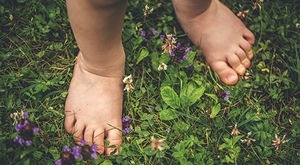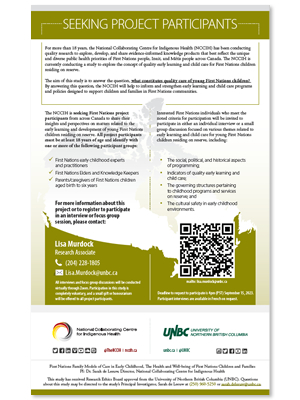
What constitutes quality care of young First Nations children?
For more than 18 years, the National Collaborating Centre for Indigenous Health (NCCIH) has been conducting quality research to explore, develop, and share evidence-informed knowledge products that best reflect the unique and diverse public health priorities of First Nations people, Inuit, and Métis people across Canada. One of the NCCIH’s more recent initiatives involves a three-part study of the Health and Well-Being of First Nations Children and Families. The overarching goal of this study is to identify and describe the factors associated with the health and well-being of First Nations children and their families for the purpose of informing and strengthening programs and policies designed to support children and families in First Nations communities. Part 2 of this study, which is the NCCIH’s current focus of the project, explores the concept of quality early learning and child care for young First Nations children residing on reserve. Specifically, this segment of research aims to answer the question, what constitutes quality care of young First Nations children?
To answer this question, the NCCIH plans to conduct a series of individual interviews and focus group discussions — with First Nations early childhood experts and practitioners, community Elders and Knowledge Keepers, and parents/caregivers of First Nations children aged birth to six years — to explore various themes related to quality early learning and child care for young First Nations children residing on reserve. The NCCIH also plans to engage in a few site visits to First Nations early learning and child care programs, to learn about and showcase promising practices in First Nations models of quality care in early childhood.
Currently, the NCCIH is seeking First Nations project participants from across Canada to share their insights and perspectives on matters related to the early learning and development of young First Nations children residing on reserve. More information about participating in this project can be found in the PDF poster.

Seeking project participants
For more information about this project or to register to participate in an interview or focus group session, please contact:
Lisa Murdock
Research Associate
(204) 228-1805
Lisa.Murdock@unbc.ca
All interviews and focus group discussions will be conducted virtually through Zoom. Participation in this study is completely voluntary, and a small gift or honourarium will be offered to all project participants.
Download the poster (PDF).